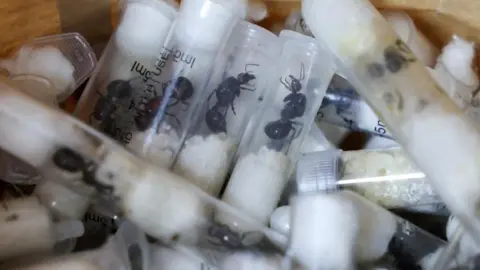Gang who smuggled thousands of queen ants sentenced in Kenya
 Reuters
ReutersA Kenyan court has sentenced four men to one year in prison or pay a fine of $7,700 (£5,800) for trying to smuggle thousands of live queen ants out of the country.
The four suspects – two Belgians, a Vietnamese and a Kenyan – were arrested last month with live ants suspected to have been destined for collectors in Europe and Asia.
They had pleaded guilty to the charges, with the Belgians telling the court that they were collecting the highly sought-after ants as a hobby and didn't think it was illegal.
But delivering the sentence on Wednesday, the judge said the particular species of ants collected was valuable and they had thousands of them — not just a few.
"While collecting a few ants might be considered a hobby, being found with 5,000 queen ants is beyond a hobby," said Magistrate Njeri Thuku.
"Already the world has lost a number of species due in part to greed. It is time to stem this tide."
She added: "This court will do what it can to protect all creatures great and small."
The contraband included giant African harvester ants, which are valued by some UK dealers at up to £170 ($220) each.
Belgian nationals Lornoy David and Seppe Lodewijckx, both 19, Vietnamese national Duh Hung Nguyen and Kenyan Dennis Ng'ang'a, were handed similar terms after the magistrate considered their mitigation arguments.
The Belgians were found with 5,000 ants while the other two were found with more than 300 ants in their apartments.
The ants were packed in more than 2,000 test tubes filled with cotton wool to help them survive for months, authorities said.
The Belgian teens had entered Kenya on a tourist visa and were staying in Naivasha, a town popular with tourists for its animal parks and lakes.
Nguyen, 23, was described by the court as a "mule or courier" as he was just sent to pick up the ants and the person who sent him paid for his ticket.
The court said Ng'ang'a, 26, acted as a "broker" due to his knowledge of the ants that are found in his rural home.
While sentencing Nguyen and Ng'ang'a, Ms Thuku said they were involved in what she described as "illegal wildlife trade and possibly bio-piracy".
David, an ant enthusiast with 10 colonies of ants at home in Belgium, belongs to a Facebook group called "Ant Gang", the court heard.
The Belgian teen, who first visited Kenya five years ago, said he had bought 2,500 queen ants for $200 when he was arrested looking for more.
While pleading for leniency, David told the court he did not know his actions, which he regretted, were illegal.
For his part, Lodewijckx said he had only offered to buy the ants for his entomology interest but his intention was not to traffic them.
 Reuters
ReutersThe court ordered the three foreigners to be repatriated to their country of origin upon payment of the fine or completion of the prison term.
The men have 14 days to appeal against the ruling.
In a statement, the Kenya Wildlife Service (KWS) hailed the ruling as a "testament to Kenya's zero-tolerance stance on wildlife trafficking".
It also highlighted the ecological importance of the giant African harvester ants, noting that their removal from the ecosystem could disrupt soil health and biodiversity.
The agency said the case sent a clear message that Kenya would "relentlessly pursue and prosecute anyone involved in the illegal wildlife trade, regardless of the species involved".
"Traffickers often underestimate the ecological value of smaller species, but their role in our ecosystems is irreplaceable," it added.
The KWS, which is more used to protecting larger creatures, such as lions and elephants, had earlier described this as a "landmark case", warning that the demand for rare insect species was growing.
In Kenya, the ants are protected by international bio-diversity treaties and their trade is highly regulated.
You may also be interested in:
 Getty Images/BBC
Getty Images/BBCGo to BBCAfrica.com for more news from the African continent.
Follow us on Twitter @BBCAfrica, on Facebook at BBC Africa or on Instagram at bbcafrica
